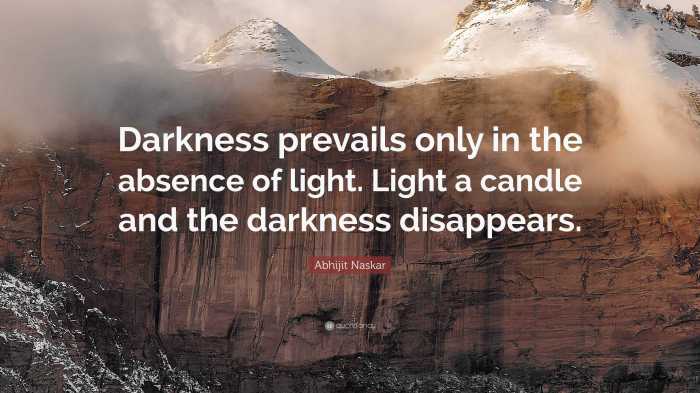In absence of light darkness prevails, a concept that resonates across disciplines and cultures, revealing the profound influence of darkness on human understanding and experience. This exploration delves into the historical, scientific, and philosophical dimensions of darkness, uncovering its multifaceted nature and enduring significance.
From ancient mythologies to modern scientific discoveries, darkness has played a pivotal role in shaping our perceptions, beliefs, and technologies. It has been both feared and revered, inspiring awe and wonder, while also posing challenges and opportunities.
Understanding the Concept
The phrase “in absence of light darkness prevails” encapsulates the idea that without the presence of light, darkness becomes the dominant force. It signifies that when light is diminished or absent, the void is filled by darkness.
Examples of this concept can be seen in various contexts:
- In the absence of sunlight, darkness covers the Earth at night.
- In a room with no windows, darkness engulfs the space.
- When a light source fails, darkness takes over.
Historical and Cultural Perspectives

Darkness in Mythology
Darkness has played a significant role in mythology across cultures. In Greek mythology, Tartarus, the realm of the dead, was described as a dark and desolate place.
Darkness in Religion
In many religions, darkness is associated with evil or the unknown. In Christianity, for example, the Devil is often depicted as a dark figure.
Darkness in Art
Darkness has been used as a powerful artistic tool. Painters have used chiaroscuro, the contrast between light and shadow, to create depth and drama.
Darkness in Science and Technology

Scientific Principles of Darkness
Darkness is the absence of visible light. It can be caused by the absorption or scattering of light by objects or particles.
Applications of Darkness
- Astronomy: Darkness allows astronomers to observe faint celestial objects.
- Photography: Darkness is essential for creating photographs, as it prevents overexposure.
- Optics: Darkness is used in optical instruments, such as telescopes and microscopes, to improve image quality.
Darkness and Human Perception
Effects on Senses, In absence of light darkness prevails
Darkness affects human senses. In low-light conditions, our vision becomes less sharp, and our hearing becomes more sensitive.
Psychological and Emotional Responses
Darkness can evoke a range of psychological and emotional responses, including fear, anxiety, and awe.
Darkness in Literature and Art

Literary Device
Darkness is often used as a literary device to create suspense, mystery, and atmosphere.
Symbolic Meanings
In art, darkness can symbolize various concepts, such as evil, ignorance, and the unknown.
Darkness in Society
Light Pollution
Light pollution, the excessive use of artificial light, can disrupt natural darkness and have negative impacts on human health and the environment.
Fear of Darkness
Many people experience fear of darkness, known as nyctophobia, which can have psychological and social consequences.
Impact on Urban Environments
Darkness plays a role in shaping urban environments. It can create a sense of safety or danger, and it can affect the way people interact with their surroundings.
Darkness in Philosophy and Religion: In Absence Of Light Darkness Prevails
Philosophical Perspectives
Philosophers have debated the nature of darkness and its relationship to light. Some view darkness as the absence of light, while others see it as a separate entity.
Religious Perspectives
In many religions, darkness is associated with evil or the unknown. However, some spiritual traditions also recognize the transformative power of darkness.
Question & Answer Hub
What is the significance of darkness in different cultures?
Darkness has held cultural significance across civilizations, symbolizing mystery, fear, and the unknown. In some cultures, it is associated with evil or chaos, while in others it is seen as a source of wisdom or renewal.
How does darkness affect human perception?
Darkness can alter our senses, making us more sensitive to sounds and smells. It can also trigger psychological responses, such as fear or anxiety, but it can also promote relaxation and introspection.
What are the scientific applications of darkness?
Darkness is essential for astronomy, allowing us to observe stars and galaxies. It is also used in photography to create specific effects and in optics to study the properties of light.